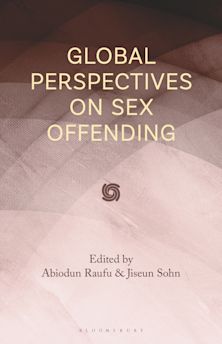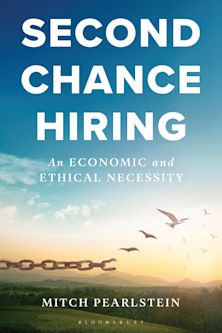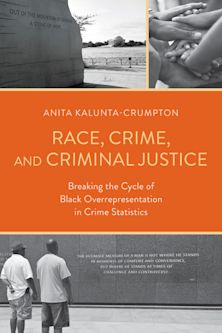- Home
- ACADEMIC
- Criminology
- Criminology - Other
- Gender, Power, and Violence
Gender, Power, and Violence
Responding to Sexual and Intimate Partner Violence in Society Today
Gender, Power, and Violence
Responding to Sexual and Intimate Partner Violence in Society Today
You must sign in to add this item to your wishlist. Please sign in or create an account
Description
What do the Catholic Church, college sports, Hollywood, prisons, the military, fraternities and politics have in common? All have extraordinarily high rates of sexual and intimate partner violence and child sexual abuse.
Sexual and intimate partner violence is part of the landscape that women and children live with. Women and children are subjected to high levels of sexual and intimate partner violence and in the era of #metoo, Gender, Power and Violence provides a nuanced analysis of the ways in which the organizational structure of an institution, like a college campus or Hollywood, can create an environment ripe for sexual and intimate partner violence and even child sexual abuse.
Gender, Power, and Violence looks at the problem of sexual and intimate partner violence through cases, observing the role that institutions play in facilitating and perpetuating gender based violence, and provides a more complex understanding about the ways in which institutional structures create an environment that facilitates and perpetuates gender based violence. Angela J. Hattery and Earl Smith touch on current events that have highlighted the pervasiveness of gender based violence across the institutions they interrogate throughout the book, but also in the entertainment industry, the government, and television journalism.
Gender, Power, and Violence gives the reader a better understanding of what factors shape who will be perpetrators, who will be victims, and how organizations respond (or not) when sexual or intimate partner violence or child sexual abuse is reported. It also offers recommendations for transforming these institutions so that they are safe for women and children of all genders.
Table of Contents
ACKNOWLEDGMENTS
CHAPTER 1: INTRODUCTION
CHAPTER 2: THEORY, HISTORY, AND TERMINOLOGY
CHAPTER 3: FRATERNITIES
CHAPTER 4: THE MILITARY
CHAPTER 5: PRISONS
CHAPTER 6: SPORTSWORLD
CHAPTER 7: THE CATHOLIC CHURCH
CHAPTER 8: HOLLYWOOD, WASHINGTON, AND THE #METOO MOVEMENT
CHAPTER 9: CONCLUSIONS AND A CALL TO ACTION
Product details
| Published | Feb 06 2019 |
|---|---|
| Format | Ebook (Epub & Mobi) |
| Edition | 1st |
| Extent | 264 |
| ISBN | 9781538118184 |
| Imprint | Rowman & Littlefield |
| Illustrations | 1 table; 5 graphs; 1 chart |
| Publisher | Bloomsbury Publishing |
About the contributors
Reviews
-
Recommended: Hattery (George Mason Univ.) and Smith (Wake Forest Univ.) provide an accessible introduction to the problem of sexual violence in American culture. Their work focuses particularly on the role that institutions and the environments they construct play in the perpetuation of sexual violence in society, drawing on examples from fraternities, the Roman Catholic Church, and the military. For the authors, the institutions featured are classic totalizing establishments that allow gender-based violence to persist by sustaining sophisticated practices of complicity through time. In addition to their focus on institutional cultures, the authors discuss with equal clarity the interpersonal dimensions and individual responses to sexual violence within which the #MeToo movement has developed. Importantly, the volume concludes by providing practical pathways for addressing sexual violence. The authors suggest that readers focus on institutional responses, reminding them that these have much power to compel behavior and set norms. Institutions can be transformative, the authors argue, when they ensure that there are clear processes that identify sexual violence as transgressive in working and living environments—processes that hold perpetrators accountable.
Choice Reviews
-
. . .a comprehensive book that interrogates many of the biggest and most influential institutions in America for their role in perpetuating gender-based violence. . . well-written and accessible, [Gender, Power, and Violence] provides solid direction and guidance for how to reduce gender-based violence, institution by institution, and overall in our culture.
Criminal Law and Criminal Justice Books
-
Hattery and Smith’s timely book is a searing, incisive look at how and why gender-based violence persists, the institutions that enable it, and the impact that it has on various groups in society. This accessible, powerful book is a must-read for anyone who wants to understand this pervasive problem—and more importantly, for anyone who wants to start thinking about solutions.
Adia Harvey Wingfield, Washington University in St. Louis
-
Too often we choose to engage in complicit silence and numbness in response to the rampant gender-based violence that seeps through our country, particularly through our male-dominated institutions. But this book reminds us that we must do more. Each chapter is a timely rallying point for not only saying #MeToo, but for saying #LetsAct to create a cultural shift where gender-based violence is eliminated once and for all.
Holly Kearl, Author of Stop Street Harassment: Making Public Places Safe and Welcoming for Women
-
In Gender, Power and Violence, Angela J. Hattery and Earl Smith illuminate the empirical connections between gender-based violence and homosocial organizations—especially those that glorify boys’ and men’s violence. The book’s timely and important message is that ending gender-based violence requires moving beyond sensitivity training and social media campaigns, to serious efforts at institutional transformation.
Michael A. Messner, Professor of Sociology and Gender Studies, University of Southern California
-
Angela Hattery and Earl Smith's book, Gender, Power, and Violence, is an excellent introductory text for courses on gender based violence. The authors present a comprehensive intersectional analysis how sexual and intimate partner violence is supported by institutional structures—an analysis that is necessary, if we are to truly end the epidemic of violence and the devastating impact of its concomitant trauma.
Claire N. Kaplan, PhD, Program Director, Gender Violence and Social Change and Men's Leadership Project, University of Virginia

ONLINE RESOURCES
Bloomsbury Collections
This book is available on Bloomsbury Collections where your library has access.



































